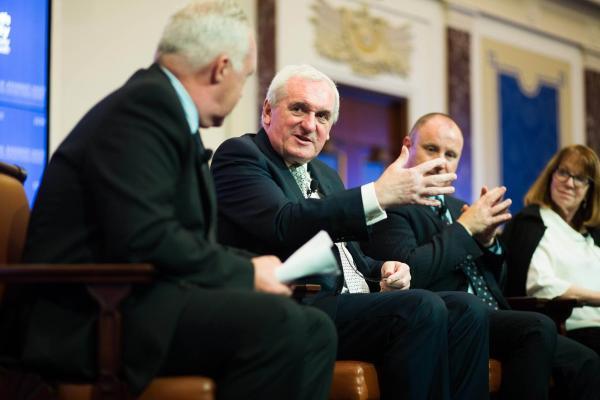September 29, 2016

Former Irish Prime Minister Bertie Ahern spoke during a panel discussion on Ireland at the Edward M. Kennedy Institute for the US Senate on Tuesday. Photo by Eric Haynes for EMK.
A discussion about the cultural identity of the Irish in the wake of the Easter Rising of 1916 and about current events in the country at the Edward M. Kennedy Institute for the US Senate in Dorchester on Tuesday night (Sept. 27) was marked by the appearance of former Irish Prime Minister Bertie Ahern and favorable mentions of the late US Sen. Kennedy’s role in aggressively pushing the peace process on the island two decades ago.
The program – “100 years of Freedom: Ireland Then and Now” – was sponsored by the Kennedy Institute in concert with the Irish Consulate in Boston and the Edward M. Kennedy Institute at Maynooth University in Co. Kildare, which places strong emphasis on conflict intervention.
Victoria Kennedy described her late husband as “both a student and a key player in the history of Ireland” as she introduced Ahern for his keynote speech.
The Irish taoiseach from 1997 to 2008, Ahern worked closely with Kennedy, whom he fondly remembered as a loyal public servant and a true friend of Ireland. Focusing on the purpose of the gathering – the last century of progress in Ireland – Ahern joked, “You can relax. I’m not going to give you 900 years of Irish history.”
In signing the Good Friday Agreement in 1998, Ahern helped to establish what he called an “exclusively peaceful and democratic” framework for power sharing in Northern Ireland. He noted that peace in Ireland was ultimately achieved through “inclusive dialogue,” which he said has gotten substantially easier over time.
In his remarks, Ahern’s addressed the difficult and complex relationship between the Irish and their history: “In order to move forward, you do have to try and leave a bit of the history behind.”
Following Ahern, the Methodist Minister Rev. Dr. Gary Mason, a research fellow at Maynooth and director of the Belfast-based organization “Rethinking Conflict,” echoed Ahern’s earlier admonition: “Try driving home by only looking in the rearview mirror. You’ll end up in the bay.”
“On both sides, we’ve done religion badly at times on the island of Ireland,” said Rev. Mason who then touched on the dangers of pitting one group of people against another. Speaking about anti-Islamic sentiment and anti-Semitism, he added, “All those ‘isms’ destroy the most basic human emotion: love.”
A panel discussion, featuring Rev. Mason, former Massachusetts Senate President Therese Murray, Professor Robert Savage of Boston College, and moderator Kevin Cullen of The Boston Globe, followed Mason’s remarks.
In closing the event, Rev. Mason remarked, “I think Ted Kennedy would have enjoyed this evening’s discussion and debate and the speakers on the panel. I think he would have seen it as a great honor.”
Topics:


